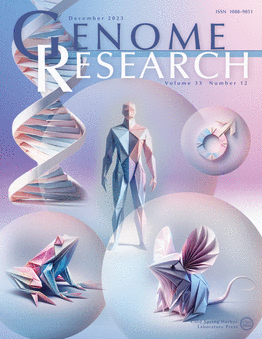雄激素受体介导的糖皮质激素受体的辅助负载调节前列腺癌细胞的转录反应
IF 5.5
2区 生物学
Q1 BIOCHEMISTRY & MOLECULAR BIOLOGY
引用次数: 0
摘要
类固醇受体广泛参与调节多种生物过程的串扰机制,在疾病,特别是癌症中具有重要意义。在前列腺癌中,雄激素受体(AR)和糖皮质激素受体NR3C1(也称为GR)之间的间接串扰已被充分证明,其中抗雄激素治疗抑制AR导致GR水平升高,使GR能够补偿和替代AR信号。然而,前列腺癌中AR和GR之间直接染色质串扰的存在及其影响尚不清楚。我们的全基因组研究表明,AR激活显著扩展GR染色质结合。在机制上,AR诱导封闭染色质位点的重塑,促进GR与不可接近位点的结合。重要的是,AR和GR的共激活在细胞群和单细胞水平上导致不同的转录反应。受这些转录变化影响的通路通常与患者生存率的提高有关。因此,AR和GR之间的直接串扰产生的结果与已知GR在规避抗雄激素阻断AR中的作用明显不同。本文章由计算机程序翻译,如有差异,请以英文原文为准。
Androgen receptor-mediated assisted loading of the glucocorticoid receptor modulates transcriptional responses in prostate cancer cells
Steroid receptors are involved in a wide array of crosstalk mechanisms that regulate diverse biological processes, with significant implications in diseases, particularly in cancers. In prostate cancer, indirect crosstalk between androgen receptor (AR) and glucocorticoid receptor NR3C1 (also known as GR) is well-documented, wherein AR suppression by antiandrogen therapy leads to elevated GR levels, enabling GR to compensate for and replace AR signaling. However, the existence and impact of direct chromatin crosstalk between AR and GR in prostate cancer remain elusive. Our genome-wide investigations reveal that AR activation significantly expands GR chromatin binding. Mechanistically, AR induces remodeling of closed chromatin sites, facilitating GR binding to inaccessible sites. Importantly, coactivation of AR and GR results in distinct transcriptional responses at both the cell population and single-cell levels. Pathways affected by these transcriptional changes are generally associated with improved patient survival. Thus, the direct crosstalk between AR and GR yields markedly different outcomes from the known role of GR in circumventing AR blockade by antiandrogens.
求助全文
通过发布文献求助,成功后即可免费获取论文全文。
去求助
来源期刊

Genome research
生物-生化与分子生物学
CiteScore
12.40
自引率
1.40%
发文量
140
审稿时长
6 months
期刊介绍:
Launched in 1995, Genome Research is an international, continuously published, peer-reviewed journal that focuses on research that provides novel insights into the genome biology of all organisms, including advances in genomic medicine.
Among the topics considered by the journal are genome structure and function, comparative genomics, molecular evolution, genome-scale quantitative and population genetics, proteomics, epigenomics, and systems biology. The journal also features exciting gene discoveries and reports of cutting-edge computational biology and high-throughput methodologies.
New data in these areas are published as research papers, or methods and resource reports that provide novel information on technologies or tools that will be of interest to a broad readership. Complete data sets are presented electronically on the journal''s web site where appropriate. The journal also provides Reviews, Perspectives, and Insight/Outlook articles, which present commentary on the latest advances published both here and elsewhere, placing such progress in its broader biological context.
 求助内容:
求助内容: 应助结果提醒方式:
应助结果提醒方式:


